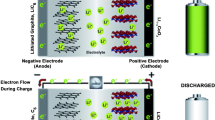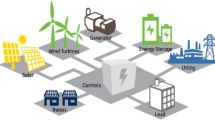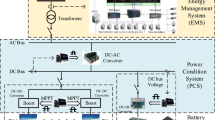Abstract
Relay coordination is reliable and crucial to guarantee that healthy feeders are properly isolated from the defective areas in a microgrid network. An appropriate protection scheme must be properly planned during the design of the microgrid to ensure safety for the power components in the event of a failure. The implementation of distributed generators in the microgrid changes the total network’s Load-Flow and often impacts the magnitude and direction of the fault current. Using the nature-inspired novel evaporation-rate-based water cycle algorithm (ERWCA), the enhancement in microgrid protection is accomplished in this work by optimizing the relay settings, reducing their operation time and time dial setting of each relay. The approach proposed is validated with the IEC microgrid benchmark system and the findings are contrasted with current techniques. It is found that the proposed strategy produces substantial improvement for the microgrid in the application of over-current relays and greatly reduces the relays’ overall net operating time.



Similar content being viewed by others
References
Hooshyar A and Iravani R 2017 Microgrid protection. Proceedings of the IEEE 105(7): 1332–1353
Aghdam T S, Karegar H K and Zeineldin H H 2018 Optimal coordination of double-inverse overcurrent relays for stable operation of DGs. IEEE Transactions on Industrial Informatics 15(1): 183–192
El Naily N, Saad S M, El Misslati M M and Mohamed F A 2019 Optimal protection coordination for IEC microgrid benchmark using water cycle algorithm. In: Proceedings of the 10th International Renewable Energy Congress (IREC), pp. 1–6
Gokhale S S and Kale V S 2016 An application of a tent map initiated Chaotic Firefly algorithm for optimal overcurrent relay coordination. International Journal of Electrical Power & Energy Systems 78: 336–342
Chattopadhyay B, Sachdev M S and Sidhu T S 1996 An on-line relay coordination algorithm for adaptive protection using linear programming technique. IEEE Transactions on Power Delivery 11(1): 165–173
Hussain M H, Rahim S R A and Musirin I. 2013 Optimal overcurrent relay coordination: a review. Procedia Engineering 53(1): 332–336
Bedekar P P, Bhide S R and Kale V S 2010 Optimum coordination of overcurrent relay timing using simplex method. Electric Power Components and Systems 38(10): 1175–1193
Noghabi A S, Mashhadi H R and Sadeh J 2010 Optimal coordination of directional overcurrent relays considering different network topologies using interval linear programming. IEEE Transactions on Power Delivery 25(3): 1348–1354
Papaspiliotopoulos V A, Korres G N and Maratos N G 2017 A novel quadratically constrained quadratic programming method for optimal coordination of directional overcurrent relays. IEEE Transactions on Power Delivery 32(1): 3–10
Birla D, Maheshwari R P and Gupta H O 2007 An approach to tackle the threat of sympathy trips in directional overcurrent relay coordination. IEEE Transactions on Power Delivery 22(2): 851–858
Razavi F, Abyaneh H A, Al-Dabbagh M, Mohammadi R and Torkaman H 2008 A new comprehensive genetic algorithm method for optimal overcurrent relays coordination. Electric Power Systems Research 78(4): 713–720
Asadi M R and Kouhsari S M 2009 Optimal overcurrent relays coordination using particle-swarm-optimization algorithm. In: Proceedings of the 2009 IEEE/PES Power Systems Conference and Exposition, pp. 1–7
Shih M Y, Salazar C A C and Enríquez A C 2015 Adaptive directional overcurrent relay coordination using ant colony optimisation. IET Generation, Transmission & Distribution 9(14): 2040–2049
Rodporn S, Kulworawanichpong T, Oonsivilai A, Uthitsunthorn D and Oonsivilai R 2012 Optimal coordination of over-current relays using differential evolution. In: Proceedings of the 9th International Conference on Electrical Engineering/Electronics, Computer, Telecommunications and Information Technology, pp. 1–4
Bedekar P P and Bhide S R 2010 Optimum coordination of directional overcurrent relays using the hybrid GA–NLP approach. IEEE Transactions on Power Delivery 26(1): 109–119
Zeineldin H H, El-Saadany E F and Salama M M A 2006 Optimal coordination of overcurrent relays using a modified particle swarm optimization. Electric Power Systems Research 76(11): 988–995
Moirangthem J, Krishnanand K R, Dash S S and Ramaswami R 2013 Adaptive differential evolution algorithm for solving non-linear coordination problem of directional overcurrent relays. IET Generation, Transmission & Distribution 7(4): 329–336
Barzegari M, Bathaee S M T and Alizadeh M 2010 Optimal coordination of directional overcurrent relays using harmony search algorithm. In: Proceedings of the 9th International Conference on Environment and Electrical Engineering, pp. 321–324
Sarkar D, Kudkelwar S and Saha D 2019 Optimal coordination of overcurrent relay using crow search algorithm Smart Science 7(4): 282–297
Saha D, Datta A and Das P 2016 Optimal coordination of directional overcurrent relays in power systems using symbiotic organism search optimization technique. IET Generation, Transmission & Distribution 10(11): 2681–2688
Radosavljević J and Jevtić M 2016 Hybrid GSA–SQP algorithm for optimal coordination of directional overcurrent relays. IET Generation, Transmission & Distribution 10(8): 1928–1937
Wadood A, Gholami Farkoush S, Khurshaid T, Kim C H, Yu J, Geem Z W and Rhee S B 2018 An optimized protection coordination scheme for the optimal coordination of overcurrent relays using a nature-inspired root tree algorithm. Applied Sciences 8(9): 1664
Srinivas S T P 2019 Application of improved invasive weed optimization technique for optimally setting directional overcurrent relays in power systems. Applied Soft Computing 79: 1–13
Kudkelwar S and Sarkar D 2019 Online implementation of time augmentation of over current relay coordination using water cycle algorithm. SN Applied Sciences 1(12): 1628
Korashy A, Salah K, Abdel-Raheem Y and Francisco J 2018 Solving optimal coordination of direction overcurrent relays problem using grey wolf optimization (GWO) algorithm. In: Proceedings of the 20th International Middle East Power Systems Conference (MEPCON), pp. 621–625
Korashy A, Salah K, Abdel-Raheem Y and Francisco J 2019 Most valuable player algorithm for solving direction overcurrent relays coordination problem. In: Proceedings of the 2019 International Conference on Innovative Trends in Computer Engineering (ITCE), pp. 466–471
Sadollah A, Eskandar H, Bahreininejad A and Kim J H 2015 Water cycle algorithm with evaporation rate for solving constrained and unconstrained optimization problems. Applied Soft Computing 30: 58–71
Eskandar H, Sadollah A, Bahreininejad A and Hamdi M 2012 Water cycle algorithm—a novel metaheuristic optimization method for solving constrained engineering optimization problems. Computers & Structures 110: 151–166
Kler D, Sharma P, Banerjee A, Rana K P S and Kumar V 2017 PV cell and module efficient parameters estimation using Evaporation Rate based Water Cycle Algorithm. Swarm and Evolutionary Computation 35: 93–110
Haroon S S and Malik T N 2016 Evaporation rate based water cycle algorithm for the environmental economic scheduling of hydrothermal energy systems Journal of Renewable and Sustainable Energy 8(4): 044501
Kar S 2017 A comprehensive protection scheme for micro-grid using fuzzy rule base approach. Energy Systems 8(3): 449–464
Author information
Authors and Affiliations
Corresponding author
Rights and permissions
About this article
Cite this article
Kudkelwar, S., Sarkar, D. An application of evaporation-rate-based water cycle algorithm for coordination of over-current relays in microgrid. Sādhanā 45, 237 (2020). https://doi.org/10.1007/s12046-020-01476-1
Received:
Accepted:
Published:
DOI: https://doi.org/10.1007/s12046-020-01476-1




